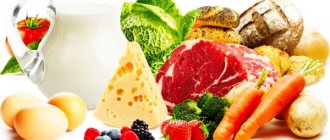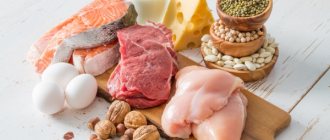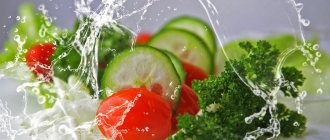By what principle should you choose nutrition for weight gain? What requirements should your diet meet? Read this article on eating for weight gain and your muscles will become really huge!
Proper nutrition for gaining weight requires a responsible approach: you should always think about whether this particular diet is suitable for gaining muscle or fat weight? To make sure your decision is correct, we will start with the very basics. You'll learn how to stay healthy and avoid gaining excess fat while you build and hone your new physique.
Diet for weight gain
This plan can be used as a template for your own meal schedule. The calorie intake in this example may not be what you want, so servings will vary based on your needs.
At the same time, individual meals are designed taking into account the best foods and their ratios to obtain strong and lean muscle mass.
You can stick to this weight gain meal plan every day, or change certain foods for variety or slowly decrease/increase your caloric intake, again depending on your results and how you feel. To see results, it is important to monitor your progress and adjust your diet. All the information you may need when creating a meal plan can be found here.
Frequency and regularity of meals
When it comes to muscle growth, it is important to constantly provide the body with energy throughout the day. This means that you will eat every 2-3 hours. It may seem strange at first, but this is the way to get the right amount of calories from healthy, whole foods.
If your goal is a beautiful body, forget about the traditional 3 meals a day. To create maximum muscle mass, you will have to eat quality foods 5-6 times a day.
Nutrient-rich, small, regular meals will prime your body for muscle growth and make it much easier to get enough calories.
The principle of eating frequently to gain weight speeds up your metabolism, allowing you to avoid gaining excess fat while you're busy building your new physique.
Don't skip meals! If you belong to the category of people who do not eat breakfast or lunch (and sometimes both together), and then make up for this deficiency in the evening, then such nutrition does not contribute to building muscle mass. If you're hungry, eat something - as long as it's a healthy snack.
How to Eat for Maximum Muscle Growth at Any Age
With age, the body's need for proteins, fats and carbohydrates gradually changes quantitatively, which makes it difficult to build and maintain muscle mass. In this article I will tell you how to properly formulate a diet so that you can stay in excellent physical shape for as long as possible!
Improving your physique is one of the few truly “ageless” hobbies that is embraced by athletes of all ages, from young teenagers to the elderly. Of course, not all of these people call themselves bodybuilders, but the majority of them, across all age groups, eat right and exercise in an effort to build more muscle. A worthy cause! Indeed, with age, the benefits of stable, strong muscle mass become more and more obvious in terms of improving the quality and length of life.
Know that you are never too old to enjoy the benefits of increased strength. But while working out plays an important role in fueling your body's transformation, the right diet also helps boost your potential physical gains. In fact, structuring your diet wisely based on your age and goals goes a long way toward achieving optimal results.
Of course, in this article I am not going to fill your head with nonsense about the existence of any universal “miracle” food or sports supplement. Just the opposite. I'll help you learn how to properly balance the classic trio of macronutrients—protein, fat, and carbohydrates—in your diet to build muscle and burn fat. With only one significant difference: you can optimize their consumption taking into account your age!
There is now a wealth of research on how athletes of different ages respond to consuming different levels and proportions of macronutrients. Below I offer you some useful recommendations regarding the correct formation of a diet for a longer stay in excellent physical shape!
PROTEIN. Get enough at any age
You probably know that protein in your diet is important for stimulating muscle growth (through muscle protein synthesis) and optimal recovery after exercise. But how does age affect this anabolic (muscle growth-promoting) response to protein?
Research shows that young people are very sensitive to the anabolic effects of amino acids. Remember the old joke about how young athletes can seemingly build muscle just by looking at a steak? Of course, this is just a vivid metaphor, but there is some truth in every joke. The reverse is also true, as some studies have shown that relatively larger doses of amino acids are required for maximum anabolic response in older adults.
Why is that? Apparently, the weakening of the reaction is explained by a decrease in the activity of the mTOR protein signaling pathway and the p70S6K enzyme, both of which are involved in initiating protein synthesis. In addition, the decrease in anabolic response in older adults appears to be at least in part due to the natural increase in oxidative stress that accompanies the aging process. Oxidative stress is essentially a type of cell damage that results in massive production of free radicals and a decrease in antioxidant levels. As the number of molecules known as "reactive oxygen species" in the body increases, the level of protein synthesis decreases.
However, including enough protein in your diet—particularly the amino acid leucine—can help prevent the decline in muscle protein synthesis that occurs with age.
Protein intake recommendations for optimal muscle building at different ages:
<18 years: 1.3-1.7 grams per kilogram of body weight
19-40 years: 1.7-2.4 grams per kilogram of body weight
41-65 years: 2.4-2.8 grams per kilogram of body weight
> 65 years: 2.8-3.3 grams per kilogram of body weight
Even if you don't calculate your protein intake to the exact gram, the key point is that as you get older, your body will need more protein. You can get it not necessarily through supplements, but simply by consuming antioxidant-rich foods. It is recommended to include enough meat, vegetables, fruits, nuts and seeds in your diet.
CARBOHYDRATES. Consume less as you age
As with protein, optimal carbohydrate intake can positively impact the rate of muscle protein synthesis. However, compared to younger people, older athletes require fewer carbohydrates to stimulate muscle growth.
Carbohydrates mainly affect muscle growth by increasing insulin secretion. Insulin promotes the entry of amino acids into cells, which stimulates muscle growth and accelerates recovery processes. In this sense, adequate carbohydrate intake is still necessary even in old age, as it helps maintain and build muscle.
For adult athletes, consuming carbohydrates with protein has been shown to have a greater anabolic effect than consuming protein alone. In addition, insulin effectively prevents protein breakdown, thus promoting muscle preservation. In addition, it has been found that consuming carbohydrates can prolong the process of building muscle mass as a result of the supply of amino acids.
Overall, you can still benefit from consuming carbohydrates as you get older. But since physical activity and metabolic rate tend to decline with age, you obviously won't need as much of it anymore. As protein intake increases, carbohydrate intake should become comparatively lower with age.
Carbohydrate intake guidelines for optimal muscle building at different ages:
<20 years: 3.7-5.3 grams per kilogram of body weight
21-40 years: 3.2-4.7 grams per kilogram of body weight
41-65 years: 2.5-4.1 grams per kilogram of body weight
> 65 years: 1.7-3.5 grams per kilogram of body weight
It's worth repeating that these quantitative recommendations are aimed at maximizing muscle growth, so they should be adjusted slightly for athletes looking to lose excess fat. In addition, all people differ in their ability to “properly metabolize” carbohydrates, that is, consume them without turning them into fat deposits. Therefore, the given figures should be your guide, but, definitely, these recommendations are not a universal truth for all athletes.
FATS. Increase your intake as your carbohydrate intake decreases
The classic way of forming a diet plan for athletes involves, first of all, meeting the need for protein, and then determining the individual optimal balance between carbohydrates and fats. Protein intake most often remains the same, regardless of whether your primary goal is building muscle or burning fat.
This approach makes the most sense because it prioritizes protein, a nutrient that most people don't consume enough of, and provides endless opportunities to individually balance the other two macronutrients. Therefore, I draw your attention to the fact that as you grow older, your fat intake should be largely determined by the level of carbohydrate intake.
In other words, while young athletes, who are more sensitive to the anabolic effects of carbohydrate consumption, are advised to consume less fat (but not less than 0.5 g per kilogram of body weight) and more carbohydrates, older people need to consume fewer calories from carbohydrates and give preference to proteins and fats.
Fat intake recommendations for optimal muscle growth at different ages:
<20 years: 0.5-0.9 grams per kilogram of body weight
21-40 years: 0.7-1.1 grams per kilogram of body weight
41-65 years: 0.9-1.3 grams per kilogram of body weight
> 65 years: 0.1-1.5 grams per kilogram of body weight
Don't stop building muscle
As people age, many people, especially middle-aged and older, begin to follow a rather haphazard approach to diet. If they want to lose weight, they do not make adjustments to their diet, but simply reduce the portion size they consume. If they are looking to build muscle, they will again follow their normal diet and simply increase their protein intake slightly by consuming protein supplements.
This approach, of course, can be effective for some people, but it is very far from ideal. You can achieve much better results by periodically making smart adjustments to the balance of your macronutrient intake. Just systematically review and update your diet plan and exercise program - and you can delight yourself with achieving maximum success at any age!
Excess calories when gaining weight
To gain weight, it is important to consume more calories than you expend—in other words, you must create a calorie surplus each day. It is difficult to get used to such a diet, however, as practice shows, it is possible.
Before you know how many calories you need to gain muscle mass, you must calculate how many calories your body requires to function properly. This number of calories maintains your current weight.
Make calories work for you - proper nutrition and nutrient ratios for mass gain
A weight gain meal plan can be broken down into a specific calorie ratio: 55/25/20. That is, you will get 55% of your calories from complex carbohydrates and fiber foods, 25% from high-quality protein sources, and 20% from natural and healthy fats.
Confused? Don't worry - you'll find out about specific products below.
By dividing your nutritional calories into the right ratio of carbohydrates, protein foods, and healthy fats, you can support muscle growth and development, providing the fuel your body needs for maximum recovery and muscle gain.
Don't you need more protein than carbohydrates to grow muscle? Not really. As long as you get enough amino acids from protein foods, your body does not need additional protein. However, to avoid burning through protein reserves, it is important to regularly supply the body with energy.
From physiology to mathematics...
It’s not without reason that they say that bodybuilding and fitness are a sport of smart people, therefore, without knowledge of how different processes in the body work, it is very difficult to achieve results. As a result, you can spend a lot of money on supplements and nutrition, but still get what you want. The first thing to start with is the concept of metabolism or metabolism. It consists of two parts - anabolism and catabolism, which ensure the growth and destruction of cells. These processes occur in the body constantly, but they can only be influenced with the help of proper diet, rest and sports nutrition.

To summarize, we can highlight that the body consists of complex substances, that is, proteins, fats and carbohydrates (BJU). It is their intake from food that allows the body to function, support vital processes and provide sufficient energy. During aerobic exercise, energy reserves are not consumed too quickly, since the body makes do with internal resources, but during strength work, many microtraumas occur in muscle tissue. To restore them, it is necessary to consume a sufficient amount of resources, as the body tries to adapt to the level of load. This is exactly how progression occurs, so the key element is not so much the training itself, but rather providing the body with everything necessary for recovery. It is extremely difficult to do this with regular food, since you will have to eat significantly more than the permissible norm, loading the digestive organs (kilograms of meat, cereals, etc.), therefore sports nutrition is not an alternative to regular products, but a useful addition. Thanks to it, you can provide the body with enough protein for muscle recovery and growth, as well as carbohydrates and fats for energy and speed up metabolic processes.
The most difficult aspect when choosing the right diet is the correct calculation of the amount of food consumed; this is where simple mathematics will help. To gain weight, you need to maintain a calorie surplus. The protein norm should be based on the calculation of 2 grams per 1 kg of body weight, and carbohydrates – 4 grams. The total calorie content should not be less than 33 kcal per 1 kg of weight. To make it easier to understand, let’s consider how many kcal are contained in each gram of BJU:
- Protein – 4 kcal;
- Carbohydrates – 4 kcal;
- Fats – 9 kcal.
As you can see, each gram of fat contains almost as many calories as grams of protein and carbohydrates combined, therefore, when creating a diet, it is extremely important not to forget about this. When calculating BJU, it is worth remembering the correct proportion; on average, the amount of protein consumed should be at the level of 30-35% of all food, carbohydrates 50-55% and fats 15-20%. BUT it is important to understand that this is just average data! To choose the ideal diet for yourself, you next need to sharpen the numbers for yourself based on the analytics of your dynamics!
Nutrition before and after workouts to gain muscle mass
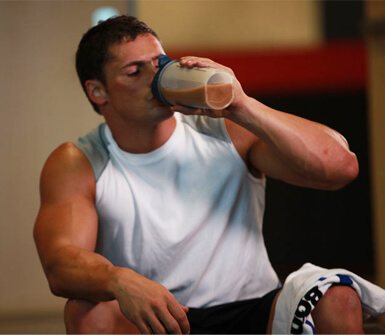
On days when you go to the gym, you should pay special attention to two meals: before and after your workout. To achieve results, it is important to provide the body with the right fuel during the pre- and post-workout period.
Pre-workout nutrition
1-1.5 hours before class, a meal should consist of complex carbohydrates and a low-fat source of protein. This will give you energy and allow you to work intensively.
If you don't have time for a full meal, make a protein shake with oatmeal. This is the perfect combination to give you strength and enhance your workout. In addition, this cocktail is convenient to take with you to work.
If time is okay, yogurt, a quality protein sandwich, or brown rice with chicken will do. These foods will also fill you with energy and prime your body for muscle growth.
Post-workout nutrition
Immediately after a workout, the body needs additional nutrients to begin muscle repair and recovery, so you should have weight gain nutrition options on hand. The fastest way to start recovery and replenish your energy is to use a protein shake and carbohydrates, such as whey protein and con-carb powder.
Pros and cons of gaining weight due to poor nutrition
Gaining weight by poor nutrition means that a person is trying to build muscle mass by eating a lot of unhealthy, fatty, processed foods, for example, a fast food lunch every day and a cake for dessert in the evenings. If you do not train intensively, then in addition to muscles, you will gain a lot of fat.
The negative consequences of gaining weight through poor nutrition are that a person gains too much fat, their health deteriorates, their energy levels become unstable, and their physical fitness leaves much to be desired. The question arises, what advantages can there be?
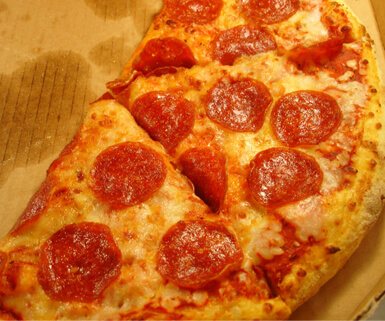
There is nothing good about an unhealthy diet. However, sticking to a diet to gain weight is much more enjoyable than going on a diet to burn fat, since the diet is not as strict. If you are one of the few hard gainers whose genetics prevent them from gaining weight and fat, then you will have to consume a huge amount of calories to grow muscle.
So, if you don't mind adding a little fat along with your muscles, you can arrange cheat days for yourself more often.
For others, gaining weight involves eating right most of the time. Although, if you allow yourself your favorite dessert, a delicious hamburger or something similar once a week, it will not harm your aspirations in gaining muscle mass. The main rule is moderation. Make sure that the calorie content of your diet does not increase by more than 600-700 calories.
However, keep in mind that if you eat everything, shouting “I’m bulking”, and at the same time do not train properly for bulk, then, unfortunately, you will turn into a bun. To make sure that the extra calories in your foods are helping you gain lean muscle mass, check your progress with a scale, in front of a mirror, or with a caliper (personal skinfold thickness gauge), which gives information about the percentage of fat and muscle in the body.
Nutrition rules for good physical shape
The main thing to achieve success is to remember the following rules:
- Every meal should contain high-quality proteins and complex carbohydrates
- Keep some protein on hand for a quick snack.
- Eat 5-6 small meals a day (or 3 full meals and 3 snacks) every 2-3 hours
- Add some healthy fats to your meals, such as natural peanut butter, nuts, olive oil, flaxseed oil, or avocado.
- Avoid preparing food using butter, oil, cream or creamy sauces. Products can be baked, grilled or steamed. Avoid fatty toppings, dressings and sauces.
- Eliminate alcohol consumption
- Make your favorite protein shake and drink it after your workout.
- Drink at least 8 glasses of water daily. Herbal teas and low-calorie drinks also count.
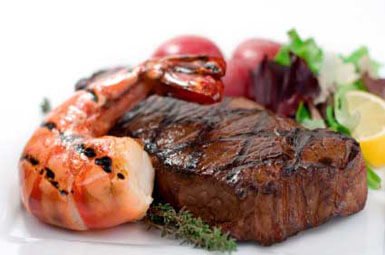
If you find it difficult to eat the same thing every day, turn on your imagination. This is where you can get creative - eat delicious food but stay true to your fitness goals. Check out this list of healthy foods that help you get fit.
You can swap and combine different high-quality sources of protein, complex carbohydrates, vegetables, fruits and seasonings as you wish. All this will only benefit you.
Eating to gain muscle mass can be interesting and varied. Just explore all the possible options for healthy products and use your imagination.
Summary
1) Eat 90% natural, whole foods
2) Eat 10% what you want
3) Eat enough to be energetic
4) Eat 2-3 times a day
5) Eat carbohydrates every day; Eat main portions after workouts and in the evening
6) Determine which foods make you feel better
7) Eat fruit


9) Don't believe myths about high protein intake

